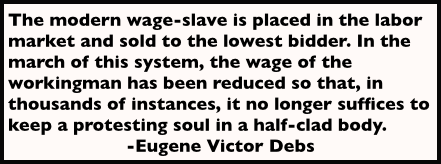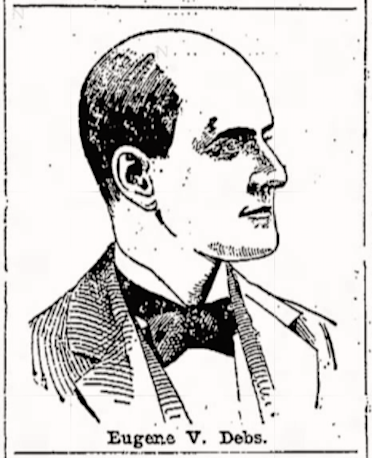
~~~~~~~~~~~~~~~~~~~~~~~~~~~~~~~~~~~~~~~~~~~~~
Hellraisers Journal – Friday December 23, 1898
Omaha, Nebraska – Eugene Debs Tells Old Story of Wealth and Poverty
On Wednesday December 21st, Eugene Debs was interviewed in Omaha and said, in part:
It is the old, old story—economics—the concentration of industry. The middle class of middlemen are being obliterated; they buy goods in small quantities and pay more than the department stores which buy by the carload. The department store advertises cheap goods, gets the laboring man’s cash, and the little corner grocery has the “credit” business. The small dealer is crushed: labor is pinched and suicides have increased 200 percent in the last ten years…..
I believe the present system, so destructive to the better elements of mankind, is soon to be eradicated, and that by the workingmen. They are beginning to think, and from the products of their minds is developing an economic revolution.
From the Omaha World-Herald of December 22, 1898:
Morally I Mean to Pay Them
[Interview with Eugene Debs]
No, I did not attend the [A. F. of L.] convention at Kansas City. I am in deep sympathy with the meeting and wanted very much to go, but my lecture engagements prevented. I have been speaking every night for two weeks.
With what success?
At Boone, Iowa, I had a fair audience, but usually through Iowa my audiences were not large. You know, the railroads and other corporations have no love for me, and it is given out cold to the men, and many of them who would attend stay away, fearful of incurring the displeasure of the powers that be. Especially is this true in railroad towns. However I cannot complain: I speak and the papers report and thus I reach the masses.
My theme?
It is the old, old story—economics—the concentration of industry. The middle class of middlemen are being obliterated; they buy goods in small quantities and pay more than the department stores which buy by the carload. The department store advertises cheap goods, gets the laboring man’s cash, and the little corner grocery has the “credit” business. The small dealer is crushed: labor is pinched and suicides have increased 200 percent in the last ten years.
The tramp in this country is the victim of the present social system. Had it not been for the environments of that system there would not have been given the impetus which started that individual upon that plain of despair in which the world now sees him.
Beginning to Think.
I believe the present system, so destructive to the better elements of mankind, is soon to be eradicated, and that by the workingmen. They are beginning to think, and from the products of their minds is developing an economic revolution.
Toil has made this nation. Compare the workingman’s degradation with that of 100 years ago. Then this country had no tramps and no millionaires. Men today are almost as bad as the chattel slaves of the South before the days of 1861, except the slave was always well fed, well clothed, and taken care of by his masters; he was not afraid of losing his job. There were no tramp slaves; they lived long and were not controlled by injunction. Now a man is not as valuable as the slave was to his master. The slave was sold to the highest bidder; the man is now taken by the employer who will pay the least for his labor.
Contract systems are not in vogue; machines are perfected so that one man can do the work of 20, but he does not get the pay of the 20 men he displaces, he gets just one man’s pay. A man will soon have to be a tramp or a millionaire, with chances of one million to one he will be a tramp. But we are making some progress—we are on the eve of a great change.
Sees the Sunrise.
I can see the rising sun of the cooperative commonwealth. The workingmen are beginning to think and they will soon begin to act, and will win, not by crime or injunction, but by a united ballot. These are, in brief, some of the themes I discuss.
My object?
To pay off the debts resultant upon the great strike, which are not legally mine to pay, but morally I mean to pay them. Lawyers, courts, injunctions, and such luxuries cost money, and our brief experience painfully demonstrated the truth of that assertion.
My attitude toward expansion?
I am opposed to it bitterly. My reasons are many, and would fill a book [see article below]. Pauper labor, open doors, open gates to the world, opportunities for plunder, large army, and hundreds of other ills follow in the wake of the annexation scheme urged by the trusts, combines, and men hunting place and power.
I lecture in Council Bluffs tonight and in Omaha Thursday night. I am under no bureau or syndicate, but out to pay debts and educate the masses on the value of the cooperative commonwealth. My engagements are made ahead until next April.
[Photograph and emphasis added.]
Note: the idea that wage slavery is worse than chattel slavery, is, of course, ridiculous. Socialists should stop making this absurd comparison. Nothing is worse for the laborer than being owned, body and soul, as a piece of property, and the children and grandchildren born pieces of property, to be bought and sold as the owner so pleases.
From the Terre Haute Gazette of December 17, 1898:
He is Opposed to Territorial Expansion
[by Eugene V. Debs]First, I am opposed to territorial expansion on the lines proposed by the present administration, because it is in flagrant violation of our traditions and the fundamental principles of our government. We have declared that “government derives its just powers from the consent of the governed” and if this be true, and I believe it is, we have no right, even though we have the power, to seize Puerto Rico, Cuba, the Philippines, and other islands that came into our custodianship as the result of the war.
Furthermore, we declared at the beginning that our war with Spain was for humanity and not for conquest, and if now we gobble up the islands and people we pretended to set free, we will stand convicted of breaking faith before the civilized world.
That the protests against expansion will go unheeded is a foregone conclusion and the reason is self-evident. Under the Republican administration Cuba and Puerto Rico will within five years be completely owned by a few plutocrats who will hold them as their private plantations and [the people of those islands] will realize that instead of having been liberated, they simply exchanged masters.
Second, a protectorate should be established over the Philippines and as soon as their domestic affairs are settled and they have established a government of their own they should be allowed to rule themselves and out their own destiny as an independent nation.
[Eugene V. Debs,
Ottumwa, Iowa
December 13, 1898]
~~~~~~~~~~~~~~~~~~~~~~
SOURCES
Quote EVD, Modern Wage Slave, Terre Haute May 31, 1898, Debs-IA
https://www.marxists.org/archive/debs/works/1898/980531-debs-thecomingnation.pdf
Eugene V. Debs Internet Archive
https://www.marxists.org/archive/debs/
Debs Internet Archive, 1898
https://www.marxists.org/archive/debs/#1898
Omaha World-Herald
(Omaha, Nebraska)
-Dec 22, 1898
https://www.marxists.org/archive/debs/works/1898/981121-debs-interviewinomaha.pdf
Later reprinted as:
“Loved by the Masses—Eugene Debs at Omaha”
Social Democratic Herald of Jan 7, 1899
-organ of the Social Democratic Party of America
(SDH pub’d in Belleville, IL,
Nov 26, 1898 to June 17, 1899)
https://lccn.loc.gov/sn82014623
Terre Haute Gazette
(Terre Haute, Indiana)
-Dec. 17, 1898
-Written by Debs at Ottumwa, Iowa, on Dec. 13, 1898
https://www.marxists.org/archive/debs/works/1898/981213-debs-territorialexpansion.pdf
Announcement:
The Eugene V. Debs Internet Archive in conjunction with Tim Davenport will be publishing a 6 volume collection of Eugene V. Debs writings. Haymarket Books will be the publishers of the 6 volumes. For weekly updates on this valuable historical project, please click here:
https://debsproject.org/
Volume I now available for pre-order:
The Selected Works of Eugene V. Debs, Vol. I:
Building Solidarity on the Tracks, 1877-1892
-ed by Tim Davenport, David Walters
HAYMARKET BOOKS, Jan 11, 2019
https://books.google.com/books?id=zmy0tAEACAAJ
IMAGE
EVD re Social Democracy, SLTb p3, Feb 9, 1898
https://www.newspapers.com/image/11123460/
See also:
Re: The Social Democratic Party of America
and the 1898 AFL Convention:
AFL Convention Proceedings
Dec 12th-20th, 1898
Kansas City, Missouri
https://babel.hathitrust.org/cgi/pt?id=inu.30000011425596;view=2up;seq=116
Socialist Resolution Defeated 1,971 to 493
https://babel.hathitrust.org/cgi/pt?id=inu.30000011425596;view=2up;seq=226
The discussion of this question began at 2:21 Friday afternoon, continued until 5:35 p. m., was resumed at 9:12 Saturday and continued until 12:25, when the yea and nay vote was taken. Twenty-seven delegates made speeches on the question.
Fifth Day-Afternoon Session = Friday, Dec 16, 1898
https://babel.hathitrust.org/cgi/pt?id=inu.30000011425596;view=2up;seq=218
Sixth Day-Morning Session = Saturday, Dec 17, 1898
https://babel.hathitrust.org/cgi/pt?id=inu.30000011425596;view=2up;seq=224
History of the Labor Movement in the United States, Vol. 2
From the Founding of the A.F. of L. to the
Emergence of American Imperialism
-by Philip S Foner
International Publishers, 1947
(pages 394-5, search: “work for an endorsement of socialism
and the S. D. P. at the forthcoming A. F. of L. convention”)
https://books.google.com/books?id=W3krAQAAIAAJ
Re “to pay off the debts…”
(=legal bills incurred by the American Railway Union
during the Pullman strike of 1894.):
The Labor World
(Duluth, Minnesota)
-of Dec 12, 1903
https://chroniclingamerica.loc.gov/lccn/sn78000395/1903-12-12/ed-1/seq-1/
Terre Haute, Ind., Dec. 10-Did the A. R. U. [American Railway Union] pay all its debts before disbanding? Some serious charges have lately been made by enemies of Eugene V. Debs in connection with the liabilities of the organization. It is well known that Mr. Debs not only gave up everything he had in the world to ascertain the power of courts in contempt cases, but he also contributed his entire earnings on the lecture platform for several years until the last bill was paid. When asked about the matter this week he said in his usual very terse manner:
The story is being circulated-for that reason may be surmised-that the American Railway Union and its president never paid a dollar of the court costs against them during their trials and that they also left their attorneys’ fees and other claims unpaid. The story is an absolute falsehood. The A. R. U. and its president paid every court claim and every lawyer fee in full and owes neither the one nor the other a farthing.
In this connection it may be said that it cost a fortune to reach the supreme court of the United States to be told there that the lower court had final say. The writer was opposed to making the effort but was overruled, the plea being made especially by the lawyers, that the decision would be of incalculable value as a precedent to the working class. The litigation cost many thousands of dollars- all the money we had in the treasury of the A. R. U. all we had personally, all we could beg, borrow or raise in any way went to satisfy the lawyers and courts-this was the price of our conviction…..
Re Debs on tour, per Tim Davenport:
From Dec 4-24, 1898, Debs made a lecture tour of 19
Iowa communities plus Omaha, Nebraska speaking on
the topic of “Labor and Liberty.”
Schedule for Dec 20-22:
Dec 20- Boone, Iowa
Dec 21-Council Bluffs
Dec 22-Omaha
https://www.marxists.org/archive/debs/works/1898/981121-debs-interviewinomaha.pdf
~~~~~~~~~~~~~~~~~~~~~~~~~~~~~~~~~~~~~~~~~~~~~
“I Hate the Company Bosses” – Sarah Ogan Gunning

